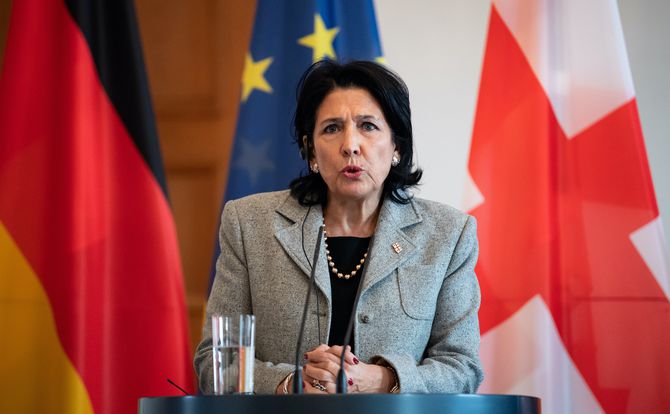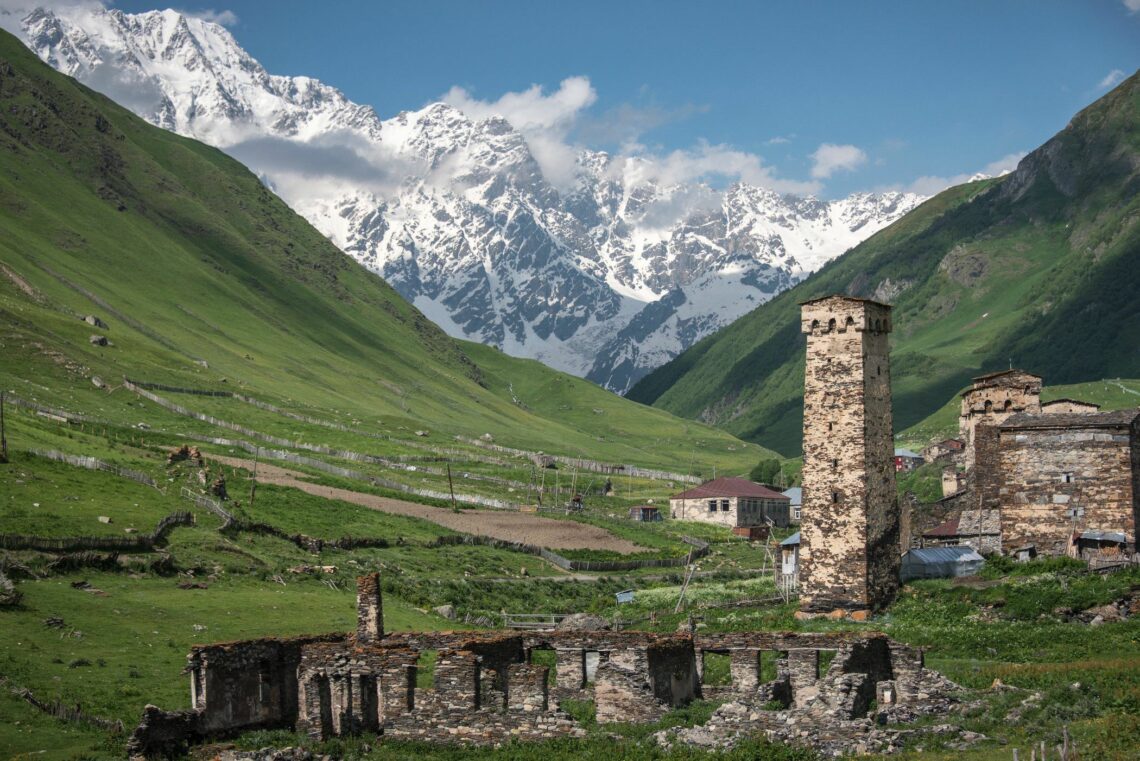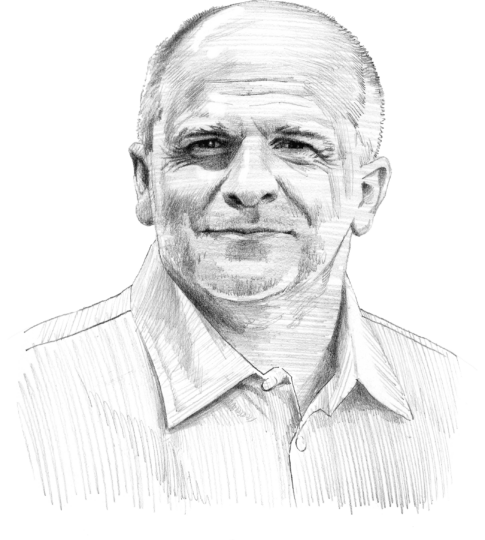Georgia: Still dreaming
Six years after President Mikheil Saakashvili lost power to his archrival, billionaire Bidzina Ivanishvili, Georgia has kept its pro-Western course in its policy. Yet Russia continues to block the nation’s EU and NATO aspirations, and Georgian voters are growing frustrated.

In a nutshell
- The decade-long rivalry of Mikheil Saakashvili and Bidzina Ivanishvili still dominates Georgian politics
- Both competing camps agree on pro-Western foreign and economic policies
- Recent protests against ruling Georgian Dream point to the millennial generation as a disruptive new force
The key to understanding Georgia is its citizens’ strong national identity and prickly sense of independence. The country has occupied a distinct geographical and cultural position since ancient times. The mythical kingdom of Colchis, where Jason and his Argonauts stole the Golden Fleece in Greek mythology, lies in modern Georgia. So does the rock on which Prometheus was bound as punishment for stealing fire. Georgia was one of the first Christian states, as demonstrated by its many churches and other ruins from the first millennium after Christ – relics unmatched in many Western European countries.
First revolt
In cultivating this national heritage, Georgian society is eager to show its independence from Russia and pro-Western orientation, which usually manifests itself as a determination to “be in Europe.” Even so, the first years of independence after the collapse of the USSR were largely wasted. Things only changed in late 2003 and early 2004, as the world watched a peaceful uprising on the streets of Tbilisi. The Rose Revolution came at a good time, putting this South Caucasus country back on the radar of experts in international relations.
Georgia was the first post-Soviet state to undergo a “color revolution” leading to a change of government. The social movement that sparked this transformation was led by two politicians: Mikheil Saakashvili and Nino Burjanadze. The immediate cause of the outbreak was voting fraud. The protesters aimed to overthrow President Eduard Shevardnadze, a well-known figure from his days as the Soviet Union’s last foreign minister under President Mikhail Gorbachev.
Frozen conflicts were an innovation that helped Russia control the post-Soviet space.
After more than a decade in power, Mr. Shevardnadze had brought Georgia to the brink of economic collapse. The country was plagued by organized crime and corruption, starting at the very top levels of politics and business. But the most pressing issue was Georgia’s territorial integrity, as three regions of the country – Adjara, Abkhazia and South Ossetia – were locked into “frozen conflicts” during the early 1990s. In these autonomous republics, separatist authorities were established with the support of the Kremlin to tear them away from Georgia.
Manipulation of such frozen conflicts was an important innovation in Russia’s efforts to reassert control over the post-Soviet space, as it allowed Moscow to act as an arbiter of territorial disputes on its periphery, such as the Nagorno-Karabakh conflict between Armenia and Azerbaijan. As a result, the Kremlin gained carte blanche to intervene in domestic politics of the former Soviet republics. In the case of Georgia, this leverage allowed Russia to curb the country’s ambitions to conduct an independent foreign and security policy, especially as regards NATO membership and integration with the European Union.
Saakashvili’s decade
In the decade after the Rose Revolution, Georgian politics were dominated by Mikheil Saakashvili, who won two terms as the country’s president (2004-2007, 2008-2013). Nino Burjanadze was speaker of the parliament and served twice as acting president while Mr. Saakashvili ran his election campaigns, but slowly lost her influence in political circles. Early on, she fell into conflict with President Saakashvili and gradually shifted to a pro-Russian position.
The American-educated Mr. Saakashvili quickly put his country onto a convergence course with NATO and the EU. This was an obvious move, since (except for the Baltic states) Georgia is the most pro-Western of all the post-Soviet societies. The new president was careful to promote young, Western-educated politicians to key positions. At the start of his first term, Mr. Saakashvili was able to reassert control over Adjara, thus disposing of one frozen conflict. He also scored significant successes in the fight against corruption.
Georgia under Mr. Saakashvili came to be regarded as a textbook example of successful post-Soviet transformation. Nowhere else in the former USSR (again, except for the Baltic states) has the fight against corruption been so effective. Even so, the most important political event during the Saakashvili administration was a bitter defeat. During the August 2008 war with Russia, Georgia lost all remaining vestiges of control over Abkhazia and South Ossetia, after the Russian military intervened massively in their support. Today, territories shelter under Moscow’s protective umbrella and elect their governments in violation of Georgian law.
The catalyst to the Russo-Georgian war was NATO’s plan to expand eastward.
The catalyst to the Russo-Georgian war was NATO’s plan to expand eastward into Ukraine and Georgia. At the alliance’s April 2008 summit in Bucharest, Russian President Vladimir Putin gave a stern warning that these proposals posed a “direct threat” to his country. In the event, he was able to block Georgia’s acceptance into a NATO membership action plan. This scuttled the ambitious concept advanced by U.S. security expert Ronald D. Asmus of extending the alliance “deeper into Eurasia…and across the Black Sea to the Southern Caucasus.”
Another legacy of the Rose Revolution was a reorientation of Georgia’s foreign trade. After Russia closed its market to Georgian goods, producers of consumer exports like wine and Borjomi mineral water were forced to find new buyers. The result was to diversify Georgia’s economy and make it less dependent on Russia. The country’s main export products are unchanged: copper ore, ferroalloys and hazelnuts.
Dominant Dream
Starting in mid-2007, a broad-based protest movement against President Saakashvili began to gather momentum, fueled by anger at what some perceived as his high-handed approach to government. The Saakashvili administration’s reforms did impinge on key interest groups, but the real problem was its excessively centralized ruling style, which was very much part of the Georgian tradition. This style fostered the emergence of a strong anti-Saakashvili opposition that increased in strength during his second term (2008-2013), especially after Georgia lost a five-day war with Russia in August 2008.
In October 2012 parliamentary elections, President Saakashvili’s ruling United National Movement (UNM) suffered a crushing defeat at the hands of the Georgian Dream coalition. The creator and head of this opposition grouping was billionaire Bidzina Ivanishvili, Georgia’s wealthiest businessman and a former ally of Mr. Saakashvili. For a little more than a year after the election, Mr. Ivanishvili served as prime minister of Georgia, before stepping down after a candidate from his party, Giorgi Margvelashvili, won the 2013 presidential elections. That ballot marked a definitive rejection of Mr. Saakashvili’s team by Georgian voters, confirmed by Georgian Dream’s decisive victory in the 2016 parliamentary elections.
Mr. Ivanishvili offered the country a less ambitious political vision.
The political vision that Mr. Ivanishvili offered to the country was considerably less ambitious and eschewed radical reform. Its practical effect was to strengthen the billionaire’s already considerable economic influence. However, there was no pro-Russian shift in foreign policy or a reversal of support for EU integration, as some had feared. Georgians remained suspicious of Russia and of politicians who advocated a rapprochement with Moscow, while support for closer ties with NATO stayed as strong as ever.
The Ivanishvili government turned out to be an effective negotiating partner with Brussels. In 2013, the two sides reached an association agreement, which was ratified and took effect in 2016. Georgia has also secured a preferential trade regime – the Deep and Comprehensive Free Trade Area (DCFTA) – and visa-free travel privileges from the EU, making it one of the three countries (along with Ukraine and Moldova) that have benefited most from the Eastern Partnership formula.
Most of the economic reforms from the Saakashvili era have been retained or continued, and Georgia is officially categorized as a liberal, free-market economy. The country ranked sixth in The World Bank’s Doing Business rankings in 2019, just behind South Korea and two notches ahead of the U.S. Economic growth is forecast at a robust 4.6 percent this year, little changed from 4.7 percent in 2018 and 4.8 percent in 2017, according to the International Monetary Fund.
Danger signal
Georgia’s political history over the past decade can be described as a personal rivalry between Mikheil Saakashvili and Bidzina Ivanishvili, won decisively by the latter. After the 2012 elections, some of Mr. Saakashvili’s former associates found themselves facing criminal charges or even prison terms. The former president himself left the country to avoid prosecution and was eventually stripped of his Georgian citizenship. After the Ukrainian revolution of 2014, the ambitious Mr. Saakashvili found employment as the governor of Odessa province under President Petro Poroshenko. Mr. Saakashvili soon began criticizing his boss and was promptly sacked, returning to Kiev only after Volodymyr Zelenskiy won the 2019 presidential elections.
Until recently, the position of Mr. Ivanishvili’s party appeared unassailable. This changed with the 2018 presidential elections, when the Georgian Dream candidate – Salome Zurabishvili – won by less than 15,000 votes in the first round. The showing was doubly disappointing because Ms. Zurabishvili ticked all the right boxes. She had no party affiliation, had served as Georgian foreign minister under President Saakashvili, and was a former French diplomat and senior civil servant with a degree from the prestigious Sciences Po in Paris.

Even so, Ms. Zurabishvili received only 38.6 percent of the vote in the first round, compared with 37.7 percent for Grigol Vashadze of the UNM – Mr. Saakashvili’s old party. Third place went to Davit Bakradze of European Georgia, another UNM offshoot.
It is true that the Georgian presidency is much weaker than when Mr. Saakashvili was in office, as Georgian Dream governments have steadily chipped away at its prerogatives. Most powers are now vested in the cabinet and the prime minister, while in practice Mr. Ivanishvili continues to pull the strings as party leader, particularly when it comes to communications and media policy. In this sense, the presidential elections mainly mattered as a test of the ruling party’s support.
The first-round result was an early warning that the Georgian public was beginning to tire of Mr. Ivanishvili. This signal was not lost on the Georgian Dream leader, who pulled out all the stops to avoid an opposition victory in the second round. Just eight days before the November 28, 2018 runoff, the government announced that the personal debts of approximately 600,000 Georgians would be written off and paid by a charity controlled by Mr. Ivanishvili. This blatant attempt to buy votes – the beneficiaries totaled 17 percent of the country’s electorate – most likely swung the election, as Ms. Zurabishvili won the runoff with almost 60 percent of the vote.
Tactful silence
The new president promises to be an effective liaison between the Georgian political elite and the Western world. She will continue repeating the mantra of Georgia’s aspirations to join the EU. However, on the subject of NATO a tactful silence is noticeable among senior Georgian officials.
The topic has become something of an embarrassment for the political elite in Tbilisi. On the one hand, the government realizes full well that NATO membership is an unrealistic prospect and to raise the subject now would only worsen relations with Russia. On the other hand, politicians recognize that NATO enlargement is what Georgians want, which makes it impossible to say a definitive “no.”
The government realizes full well that NATO membership is unrealistic.
Mr. Vashadze’s result gives him reason to believe the United National Movement can win the next election. He has already begun to assemble a shadow cabinet, with both new and old faces. More importantly, he has sent a clear signal that this is no longer Mr. Saakashvili’s party. Georgia is a society that puts a premium on personal independence, which means that Mr. Vashadze’s future success depends on convincing people he will not go back to the strong-arm tactics of the Saakashvili era. If he proves persuasive, the UNM has a good chance of expanding its electorate and defeating Georgian Dream in the 2020 elections.
Y factor
A catalyst for public discontent with the ruling party was this year’s annual meeting of the European Interparliamentary Assembly on Orthodoxy in Tbilisi, at which a Communist deputy to the Russian Duma, Sergei Gavrilov, addressed listeners in Russian from the chair of the Georgian parliamentary speaker. That affront sent infuriated opposition protesters into the streets and forced the resignation of Speaker Irakli Kobachidze, an up-and-comer among Georgian Dream’s younger generation of leaders, the next day. Russia was quick to respond with political and economic pressure (suspending commercial flights between the two countries), hoping to capitalize on the protest to destabilize Georgian politics.
As always, the political dispute in Georgia is less about policy (on which there is broad agreement) than about personal, ethnic and business animosities within the country’s elite. The argument is more over style than substance.
With the latest wave of protests, however, a new factor has entered Georgian politics: generational conflict. The streets were filled with 20- and 30-somethings, the millennials from Generation Y, virtually none of whom had taken part in the Rose Revolution. As with similar movements in other countries around the world, they reject the “old elites” and mobilize support through social media. For now, they have thoroughly disrupted Georgia’s political scene.
The perennial problem of Georgian politics is what to do with Mikheil Saakashvili.
It still seems rather unlikely that a completely new political movement can be put together from scratch to defeat Georgian Dream in next year’s general elections – though wealthy Georgians could no doubt be found to bankroll such a force, should it arise. It would serve as a focus of popular discontent, either on its own or in conjunction with the two main opposition parties.
Under a different scenario, the mainstream opposition, primarily the UNM, would assume leadership of the protests. Here the perennial problem of Georgian politics would reappear: What to do with Mikheil Saakashvili? For his part, after Volodymyr Zelenskiy’s ascent to power in Ukraine, Mr. Saakashvili seems to be playing politics in two countries at once. But if the opposition cannot win over the organizers of the protest movement and their young followers, the most likely scenario is that Georgian Dream and Mr. Ivanishvili will be able to hang on to power after the 2020 elections, if only by the skin of their teeth.
Priorities and constraints
A paradox of today’s Georgia is that irrespective of who governs the country, its situation will stay the same. The basic policy course charted under President Saakashvili is still in place, but the reluctance of Western political elites to let Georgia join the EU and NATO appears impossible to overcome. Russia’s influence is too great. Yet the determination of most Georgians to become part of the West is equally implacable. For now, they must content themselves with dreams.
In its current predicament, the best Georgia can do is to devise a development model that takes advantage of its trade agreement with the EU, U.S. political support, and commercial cooperation with China and Turkey. The key to success is attracting new foreign investors and commercial partners to offset traditional Russian influence.
Tbilisi is trying to diversify its foreign policy options beyond Russia and the West.
Mr. Ivanishvili is trying to diversify Tbilisi’s foreign policy options by finding a “third partner” to set beside Russia and the West. In 2017, Georgia signed a free trade agreement with China. The country’s strategic location in the South Caucasus, astride important sea and pipeline routes, makes it of natural interest to Chinese policymakers and investors. In terms of trade, China is already one of Georgia’s main trading partners, just behind Turkey, Russia and Azerbaijan. The leading foreign investors are Azerbaijan, Turkey, the United Kingdom, the Netherlands and the Czech Republic.
Georgia’s location, climate and geography make it a natural destination for tourists. This has made tourism a key growth industry and investment magnet, with spillover effects on construction and other service industries. Tourism also presents an opportunity for young Georgians to find jobs at home, while its diversification away from Russian and toward Western European customers accelerates the economy’s integration with the EU.
Only two things can deflect Georgia from this development path – internal political upheaval or another conflict with Russia. Avoiding both is the main task of any government in Tbilisi. These priorities and constraints will apply no matter who wins the 2020 elections.








